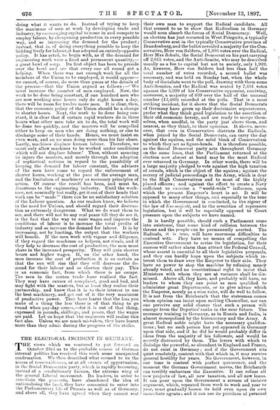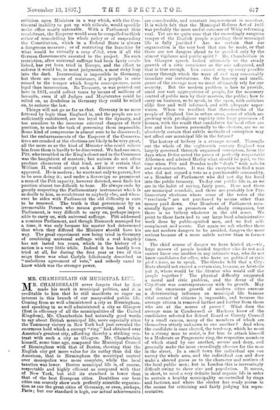T1TE ELECTORAL INCIDENT IN GE11,11ANY.
• THE views which we ventured to put forward on October 23rd as to the probable course of German -internal politics has received this week some unexpected confirmation. We then described what seemed to us the access of reasonableness, or at all events of opportunism, in the Social Democratic party, which is rapidly becoming, instead of a revolutionary faction, the extreme wing of the general Liberal movement. Its leaders, in order to conciliate the peasants, have abandoned the idea of nationalising the land, they have consented to enter into -the Parliamentary life of Prussia as well as of Germany, ,and above all, they have agreed when they cannot seat their own man to support the Radical candidate. All that seemed to us to show that Radicalism in Germany would soon absorb the forces of Social Democracy. Well, an election has just occurred in West Priegnitz, a typically Conservative seat in the typically Conservative province of Brandenburg, and the ballot revealed a. majority for the Con- servative, Herr von Saldern, of 1,895 votes over the Radical, Herr Max Schulz, the Social Democrat on his part carrying off 2,015 votes, and the Anti-Semite, who may be described usually as a foe to capital but not to society, only 1,909. As, however, Herr von Saldern had less than half the total number of votes recorded, a second ballot was necessary, and was held on Sunday last, when the whole body of Socialists went to the poll, drawing with them some Anti-Semites, and the Radical was seated by 7,481 votes against the 5,999 of his Conservative opponent, receiving, moreover, a majority of 639 over the half of the unusual number (13,480) recorded at the polls. That is a most striking incident, for it shows that the Social Democrats of Germany have given up their doctrinaire separateness, prefer what they think good legislation to the assertion of their old economic heresy, and are ready to merge them- selves, when needful, in the party just above them, and nearest, as they think, to their opinions. It shows, more- over, that even in Conservative districts the Radicals, when joined by the Social Democrats, can carry the day against the squires, and the solid block of Conservatism to which they act as figure-heads. It is therefore possible, as the Social Democrat party acts throughout Germany on the same lines, that the Parliament returned at the election now almost at hand may be the most Radical ever returned in Germany. In other words, there will be a large majority pledged to vote against the high taxation of cereals, which is the object of the squires ; against the secrecy of judicial proceedings in the Army, which is dear to the High Conservatives and to most of the highly placed officers ; and against the effort to create a Navy sufficient to exercise a. " world-wide " influence, upon which the present Emperor's heart is set. It will be opposed to many other things, and especially to the tone in which the Government is conducted, to the rigour of the law of kse-nwjeste, and to the seventies of repressive legislation, but it will be especially opposed to Court pressure upon the subjects we have named.
It is hardly possible, should such a Parliament come into existence, that some kind of collision between the throne and the people can be permanently averted. The Radicals, it is true, will have enormous difficulties to contend with. They have no means of compelling the Executive Government to revise its legislation, for their success will rather alarm than attract the Federal Council, whose assent is essential to all their legislative proposals, and they can hardly hope upon the subjects which in- terest them to draw over the Emperor to their side. They have no power to stop the machine by refusing money already voted, and no constitutional right to insist that Ministers with whom they are at variance shall be dis- missed. Above all, they have, and probably will have, no leaders to whom they can point as men qualified to administer great Departments, or to give advice which the Emperor, merely as a wise ruler, will do well to follow. It is not from the Reichsrath that the statesman comes whom opinion can insist upon making Chancellor, nor can one perceive any solid chance that such a person will emerge from the Deputies' ranks in the near future. The necessary training in Germany, as in Russia and India, is almost monopolised by the bureaucracy and the Army. A great Radical noble might have the necessary qualifica- tions; but no such person has yet appeared in Germany upon that side, and if he did he would probably differ in ideas from the majority of his followers, and would be secretly distrusted by them. The levers with which to dislodge the powerful, so abundant in England and France, do not exist in Germany ; and if the Government sits quiet resolutely, content with that which is, it may survive general hostility for years. No Government, however, in our time is content with perfect quiescence, and the moment the German Government moves, the B‘eichsrath can terribly embarrass the Executive. It can refuse all new projects of law, all new taxation, and all new loans. It can pour upon the Government a stream of incisive argument, which, repeated from week to week and year to year, must gradually loosen its hold even upon its own ienuediate agents and it can use its privilege of personal criticism upon Ministers in a way which, with the Con- tinental inability to put up with ridicule, would speedily make office nearly untenable. With a Parliament thus recalcitrant, the Emperor would soon be compelled to think either of remodelling his whole policy or of suspending the Constitution, which in a. Federal State is always a dangerous measure ; or of restricting the franchise by what would be virtually a coup d'aat, even if all the German Governments assented to the project. No such restriction, after universal suffrage had been fairly estab- lished, has yet been tried in Europe, and the effort to enforce it would be, in most judgments, a most risky leap into the dark. Insurrection is impossible in Germany, but there are means of resistance, if a people is once roused to the temper which forgets consequences, more legal than insurrection. No Treasury, as was pointed out here in 1831, could collect taxes by means of millions of lawsuits, even if all Judges and Magistrates could be relied on, as doubtless in Germany they could be relied on, to enforce the law.
Things will not go as far as that. Germany is no more fettered by logic than England is, and the people are not sufficiently embittered, are too loyal to the dynasty, and too sensitive to the immense external dangers of their position, to make the task of governing them impossible. Some kind of compromise is almost sure to be discovered; but the embarrassments of the Emperor if the Conserva- tives are crushed at the elections are likely to be very great, all the more so as the kind of Minister who could relieve him from them is hardly to be discovered. We had one once, Pitt, who trembled in the King's closet and in the Commons was the haughtiest of masters ; but nations do not often produce characters of that kind, nor is it certain that William IL would accept such a Minister even if he appeared. He is modern ; he wants not only to govern, but to be seen doing it ; and under a Sovereign so prominent a man of the Pitt capacity, however devoted, soon finds his position almost too difficult to bear. He always ends by greatly respecting the Parliamentary instrument which is so docile to him, so recalcitrant to anybody else, and when- ever he sides with Parliament the old difficulty is sure to be renewed. The truth is that government by an irremovable Person who means governing, and by a Parliament, is very difficult to carry on, perhaps impos- sible to carry on, with universal suffrage. Pitt addressed a nominee Parliament, and though Bismarck managed for a time, it was only because his master had determined that when they differed the Minister should have his way. The great experiment now being tried in Germany of combining universal suffrage with a real kingship has not lasted ten years, which in the history of a nation is a very little while. Indeed it has hardly been tried at all, for during the first year or two of this reign there was what Carlyle felicitously described as "melodious agreement of vote," and nobody cared to know which was the stronger power.







































 Previous page
Previous page